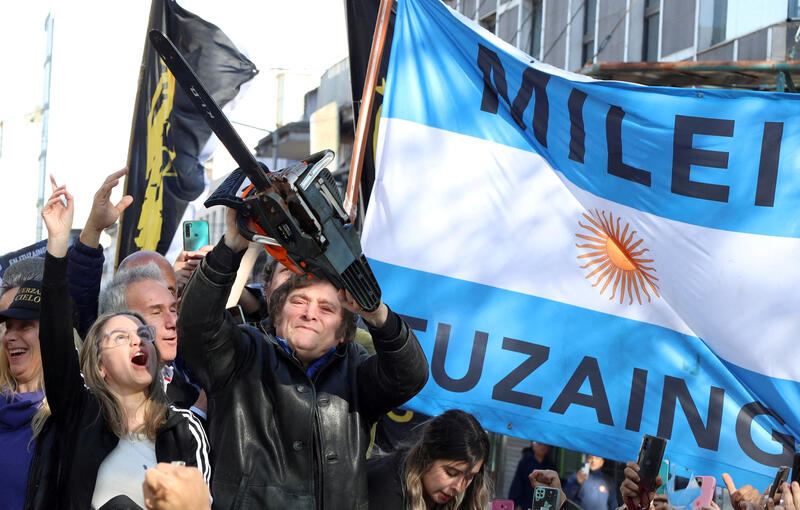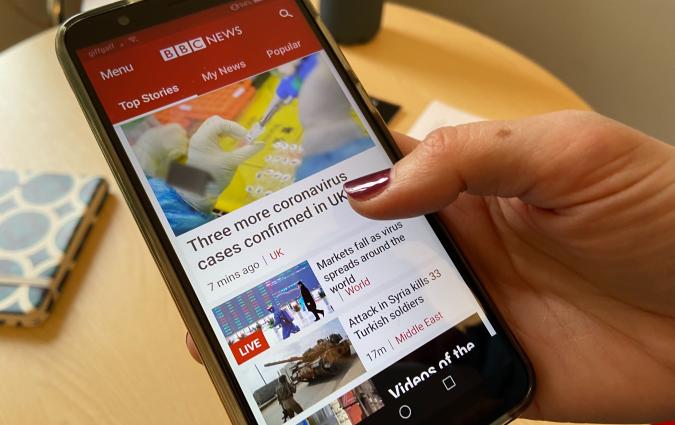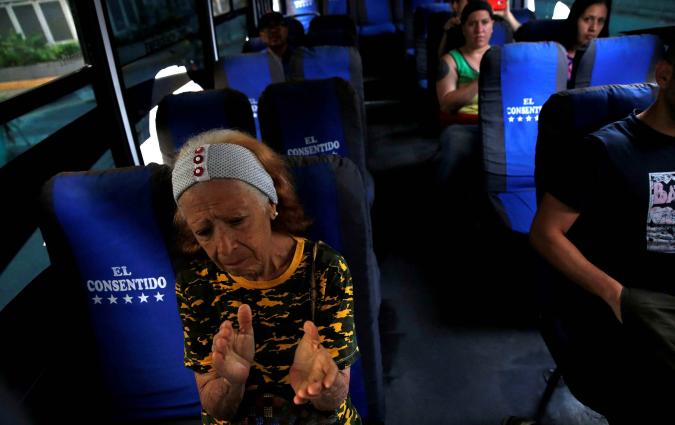Argentina’s new president wants to privatise public media. But will he be able to do it?

Javier Milei holds a chainsaw next to Carolina Piparo, candidate for Governor of the Province of Buenos Aires, during a campaign rally, in Buenos Aires, Argentina September 25, 2023. REUTERS/Cristina Sille
One of the first promises that Javier Milei made after he was elected President was to privatise Argentina’s state-owned media outlets: Televisión Pública, Radio Nacional and Télam, a news agency. This promise is in line with Milei’s libertarian agenda, which includes the elimination of a number of Ministries and ‘dollarising’ the Argentinian economy.
Milei justified his pledge by calling the country’s public broadcaster “a propaganda mechanism.” According to our Digital News Report 2023, up to 16% of Argentinians use Televisión Pública for news offline and 10% do it for news online. These figures put the public broadcaster far behind private competitors such as TN and Telefe.
Argentina’s public broadcaster also seems to have a trust problem. Only 36% in our sample say Televisión Pública is trustworthy. The figure is higher for Telefe (56%) and TN (52%).
Natalí Schejtman is a journalist and a professor at the University of Torcuato Di Tella in Buenos Aires. Her book, Pantalla Partida: 70 años de política y televisión en Canal 7, discusses the history of Argentina's public television, also known as Canal 7, from Peronism to the present.
I spoke with Schejtman in early December to learn more about how the Argentine public media work, why Milei wants to put them in private hands and what are the real chances of that happening. Our dialogue has been edited for brevity and clarity.
Q. To what extent is Milei's promise to privatise Argentine public media viable?
A. We still do not know. During Milei's campaign the issue was not so present. It appeared with a few glimpses, perhaps sometimes even in the form of an outburst rather than a well thought-out proposal.
In the 2015 campaign of Mauricio Macri [the conservative candidate who won the presidency], the issue of public media was a much more important topic. That’s because public media had been very important during Kirchnerism [the branch of Peronism promoted first by Néstor Kirchner and then by his widow, Cristina Fernández]. [Public media] had been expanded. New outlets had been opened. They had increased their size and their interference in what was called "the cultural battle” of the Kirchnerism government against the Clarín group.
In 2019, [presidential candidate] Alberto Fernández was also asked several times [about public media]. The issue was more present in 2019 than in the 2023 campaign. How likely is it that Milei will privatise the media? We don't know. It is not easy, in terms of procedure, to carry out any privatisation, and this one is obviously not on the agenda either. So we are going to see what the project is, if it is sustainable, etcetera. Everything remains to be seen, beyond the fact that the intention was explicitly manifested.
Q. What does public media, especially TV Pública, represent for Argentinians and, on the other hand, for Milei and his supporters?
A. Televisión Pública is more than 70 years old. It was the first television channel in Argentina but it was always very associated with governments. The first broadcast of TV Pública was a very important event on 17 October, which is the Peronist Loyalty Day. It was never able to get rid of this association with [Argentinian] governments.
This made it more difficult, in a sense, to be more predictable for audiences. Argentina is a country that has had lots of political instability, especially in the past. So, when the authorities changed after an election, the channel's leadership changed.
TV Pública has always had cultural programming. It has had some programs that represent the geographic diversity of the country, unlike other channels that do not have that as one of their mandates. For Milei and for other audiences, it also represents that association with governments. The outlet is also perceived that way.
Milei said the channel always covered his party very negatively. He insisted on this aspect of lack of pluralism. For Milei, the channel represents a propaganda outlet, an expense and a source of value for its real estate assets.
Q. According to Milei, Televisión Pública is a "propaganda mechanism" where 75% of the time that his party was talked about was in a negative way. How accurate is his assessment of the channel?
A. Historically [Televisión Pública] has been perceived as a place that tends to express with more preference the voice of the government and this happens for many reasons.
In the 90s, during President Carlos Menem’s mandate, you can trace this series of editorialists or journalists closely associated with the government. This also happened during Argentina’s dictatorships.
In the last one, 40 years ago, something important happened with the coverage of the Falklands War. During the war, Canal 7 [another name for Televisión Pública] was absolutely associated with the celebratory propaganda and even wrongly said that Argentina was winning. During the dictatorship, the idea of propaganda was much clearer, because there was a relationship of absolute dependence with the government.
What Milei says is not something he came up with. At the same time, he says it with a degree of disdain that does not allow to visualise a solution. The idea of privatisation is a solution that basically implies not solving the problem of pluralism. I don’t think he is interested in solving the problems his diagnosis points to. He’s just saying, "Bye-bye, out."
If Canal 7's problem is that it campaigned negatively for Milei, that problem is not solved by privatisation because no one says that private media are more plural than public media. The question is whether privatisation solves that problem. I would say it doesn’t. A privatisation does not solve that problem and at the same time generates other problems.
Q. This is not the first time that the idea of privatising public media has been floated. In your book on the history of Televisión Pública or Canal 7 as it is also called, you recount a privatisation in the 50s and two efforts to privatise it in the 90s. What can you tell us about those efforts and how do they help understand the current one?
A. The big question is who would buy a television channel today. Many people would say that television channels are not just businesses. Media outlets could be bought for their strategic-political functionality.
In the 90s a lot of state-owned companies were privatised, but Canal 7 was not privatised. Menem's government was ambivalent about the possibility of privatising it.
It was a moment of very strong transformation for the media ecosystem. In 1989, two television channels in the hands of the State were privatised. During the 90s, a professionalisation of the media industry took place, including the birth and growth of holding companies. Across that decade, the different actors who had influence in the government did not know what to do with Canal 7. The decision was to leave it in the hands of the State.
They called one person, who was a very competent producer of theatre and television, and he implemented the slogan 'Now We Also Compete', as if to say, 'it is going to remain in the hands of the State but the State can compete with the private media.' That was a strategy that did not work. Afterwards, privatisation began to be considered more seriously and there was a series of comings and goings, which activated several levers.
The first one was the parliamentary lever: a law had to be modified to privatise Canal 7. The second one was the unions lever: unions were also very strongly activated during the whole decade. Finally we had the political levers: Menem began to have a very strong opposition, and there were many cultural and civil society referents who said Canal 7 shouldn’t be privatised.
Q. And what about today?
A. The media situation today could not be more different. The media ecosystem is changing. Channels are being transformed. Televisión Pública is not what it was in the nineties either.
So, in terms of Canal 7, the question is: Who could buy it? But also, there are other questions about how viable privatisation is.
[Hernán] Lombardi, who was the person in charge of the Federal Public Media System until 2019 and who today is a member of parliament, said in an interview that there were three options for public media: closure and liquidation, privatisation, and transformation into a cooperative. We have to see what is being evaluated and what the project is going to be like.
Q. Milei's case is not the first time a right-wing leader has sought to privatise public media. Recently Boris Johnson in the United Kingdom and Jair Bolsonaro in Brazil had ambitions to privatise public media. Why do you think this happens?
A. There is a view that the state has to be smaller. But there is a particular view about not understanding the function of the public media. You have to realise what Milei is saying when he attacks the public media for the coverage they did. It is not an attack only because of what it costs, but because they covered him negatively. So it is a combination of two recurring themes we see in other governments.
In the case of Brazil, public media were very much promoted and very much expanded by Lula [in his previous term]. Lula created Empresa Brasil de Comunicação in 2007 and Bolsonaro announced that he was going to privatise it, but in the end he did not succeed. So in the case of Bolsonaro, there is also an extra element of revenge.
In the case of Milei, it is still a bit premature to say what will happen. So far he already mentioned the negative coverage he received, but he did not mention what a quality public media could be like.
Public media have problems and they have problems it is essential to solve. Defending them does not have to imply denying those problems. Rather, it has to imply precisely looking for a proposal to finally build a more legitimate, more credible, more sustainable public media, and one that contributes more to strengthen our democracy. I believe they have that potential.
Q. According to our Digital News Report, the media landscape in Argentina is characterised by concentration in the private sector – with the most consumed media being private, the weakness of public broadcasters and the growing distrust in all media. Having said that, what is the importance of maintaining public media in Argentina?
A. State-owned media have a social function. Argentina has a very concentrated system. In this context they have a role not only as screens of national content and formats that allow debate, but screens that aim at more cultural formats, of public interest and tending to reflect the realities of all the regions of the country.
They also carry out a very important archiving work, which is the digitization of the audiovisual archive. All these are infrastructures that are part of Argentina's cultural and audiovisual heritage.
I think it is important to articulate an idea, which is the fact that there are things in which public media has to improve a lot. It does not mean that they should be handed over [to a private group] and that they should no longer exist. It means that they have to be improved.
It seems to me that they are strategic not only for democracy, but also for the audiovisual industry and they must be improved in that direction, so that they can better fulfil their social function for democracy and their strategic function for development.
In every email we send you'll find original reporting, evidence-based insights, online seminars and readings curated from 100s of sources - all in 5 minutes.
- Twice a week
- More than 20,000 people receive it
- Unsubscribe any time







